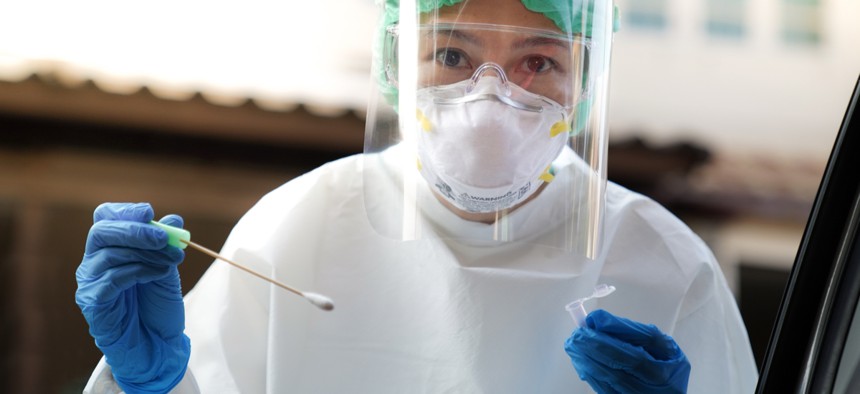Bipartisan Bill Would Standardize Public Health Data and Bolster Sharing

Pordee_Aomboon/Shutterstock.com
The legislation would also establish a cross-agency working group for ongoing recommendations.
A bipartisan group of lawmakers introduced legislation on Friday that would standardize public health data collection and make it easier for federal agencies and states to share information in an effort to improve their response to the pandemic and other public health emergencies.
Reps. Scott Peters, D-Calif.; Lucy McBath, D-Ga.; Anna Eshoo, D-Calif.; and Brian Fitzpatrick, R-Pa., introduced the “2020 Health Statistics Act” to amend the Public Health Service Act, which outlines the Health and Human Services Department’s legal authority to respond to public health emergencies. By making data such as testing time and hospitalization rates more accessible and useable, the proposed bill builds on the “2018 Evidence Act,” which sought to ensure that government programs and policies are based on sound data.
In mid-July, the Trump administration ordered hospitals to report their coronavirus data to a private contractor through HHS instead of the Centers for Disease Control and Prevention, which has traditionally been in charge of public health data. This prompted concerns among lawmakers and experts that the new data protocols could undermine pandemic response.
“Efforts to combat this [coronavirus] crisis are heavily stifled by our country’s lack of a cohesive, consolidated data system. We don’t have the granular data we need to strategically fight the virus or understand the unique risks and effects of COVID-19 on vulnerable populations,” said Peters. “Our bill would ensure vital information often missing from current reports, such as race or mortality data, is collected and shared accordingly so that patterns can be found and relief can be more rapidly deployed.”
If enacted, the bill would require HHS to share its collected data with CDC and other public health agencies and the public (while still protecting individuals’ privacy); work with the CDC and other relevant agencies to develop standards for data collection; streamline reporting requirements for hospitals and other entities; launch a grant program to help state, local and tribal public health departments modernize their data systems; and expand the federal data linkage program.
The data linkage program connects the National Center for Health Statistics’ population surveys with other administrative records to bolster analysis on diseases and healthcare and inform policy making. Under this bill, the program would extend to public health trends related to housing and food instability, access to transportation, social connections and more.
The legislation would also establish a permanent working group to provide ongoing recommendations on the standards and the burden from federal requirements, among other things. Members would include: representatives from the National Center for Health Statistics; CDC; various HHS offices; the Office of Management and Budget’s Office of Information and Regulatory Affairs; the National Institute of Standards and Technology; the Veterans Health Administration; Military Health System and Indian Health Service.
The bipartisan legislation would “help achieve better patient outcomes and will save more lives by providing researchers with better access to higher quality data,” said Fitzpatrick. Eschoo noted that besides supporting the pandemic response, the proposal would help the nation’s response to suicides, maternal mortality and pediatric deaths.
In their press release, the lawmakers cited former CDC Director Dr. Tom Frieden, president and CEO of the Resolve to Save Lives, an initiative of the global public health organization Vital Strategies, who said the country’s lack of data standardization has led to its failure to contain the coronavirus. Additionally, a group of House lawmakers last week asked the Government Accountability Office to review the switch in coronavirus data reporting, noting that the new system may not be using validated data, is “overly cumbersome” and allegedly was developed without input from public health experts and other stakeholders.
The bill is supported by the Data Coalition, a trade group that works to make government information more accurate and accessible.
“The pandemic highlights something we have known for years—that our country’s data infrastructure needs continuous improvement and resources to adjust to emerging priorities,” said Data Coalition CEO Nick Hart on Friday. The bill “will ultimately support evidence-based decision-making, higher quality open data, and responsible data sharing,”
NEXT STORY: FCW Insider: Aug. 25






